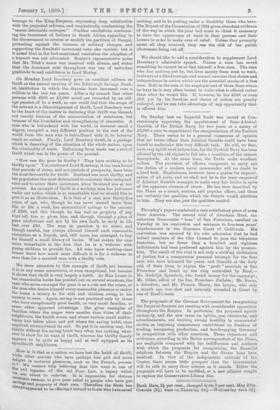"How can the poor be thrifty P They have nothing
to be thrifty upon." Yet, continued Lord Rosebety, it has been found that periods of stress, and not periods of prosperity, have been the most favourable for thrift. Scotland was most thrifty, and her population the most determined to maintain their independ- ence and to scorn State assistance, when Scotland was at her poorest. An example of thrift in a working man has just come under our notice which is so remarkable that we should like to give it as an illustration. It is that of a man now thirty-five years of age, who, though he has never earned more than 25s. or 26s. a week, has accumulated savings to the amount of £260, and this though he has had no property. of any kind left him or given him, and though, through a piece of pure misfortune and not by his own fault, he early in life lost over £50. The man in question is no miser, and though careful, has always allowed himself such reasonable recreation as a bicycle, and, still more, has managed to buy for himself a small library of books. What makes the case more remarkable is the feet that he is a widower with Young children to provide for. All who know working-class homes know bow much more difficult it is for a widower to save than for a married man with a thrifty wife.












































 Previous page
Previous page